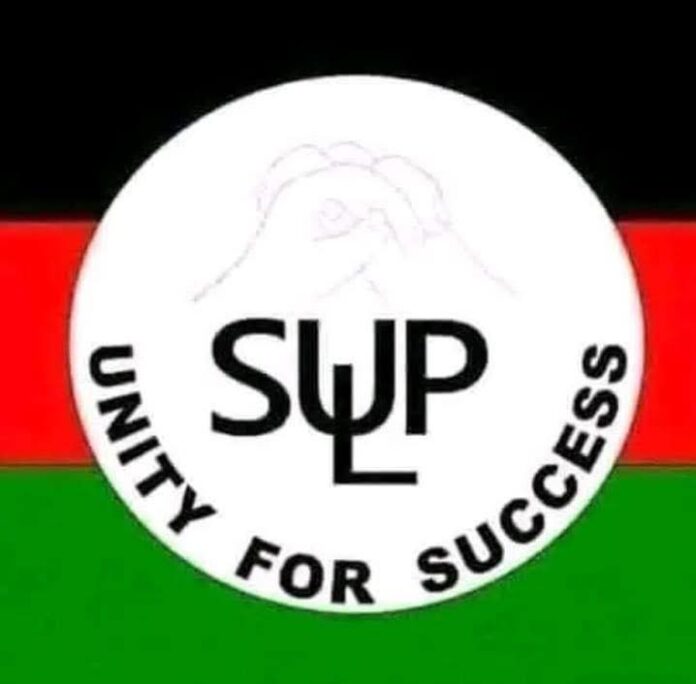In a bold and ideologically nuanced statement, the Vanguard Student Unification Party (SUP) of the University of Liberia has publicly disassociated itself from the much-anticipated July 17 protest organized by the advocacy group STAND, even as it issued a stern warning to the government of President Joseph Nyuma Boakai. SUP’s communiqué reflects a strategic positioning: distancing from the protest’s organization while simultaneously amplifying its core grievances against what it calls a “corrupt and dictatorial” administration.
The protest, themed “Enough is Enough,” is expected to see mass mobilization from across civil society sectors, including street vendors, student activists, tricycle unions, and civil servants. While the movement draws attention to unmet political and socio-economic demands, SUP’s divergence from it reveals deeper concerns about ideological purity and protest leadership in Liberia’s ever-fractured political opposition landscape.
SUP’s decision to “categorically distance” itself from the protest does not stem from alignment with the government but rather from concerns over the protest’s organizational ethos. According to the statement signed by Secretary-General Odecious Mulbah and approved by Chairman Sylvester Wheeler, the protest lacks “ideological clarity” and is “influenced by selfish naked interest.”
This signals SUP’s enduring commitment to ideological consistency—a posture inherited from its revolutionary student roots dating back to the 1970s. The party’s message positions itself not as an automatic ally of every anti-government cause, but as a principled actor that supports mass action only when led with discipline, critical consciousness, and clear vision.
In short, SUP’s absence from the protest is not apathy; it is critique.
Warning to the Boakai Government: Uphold Constitutional Rights
Despite its organizational distance from the protest, SUP used the moment to issue an unequivocal warning to the government and its security apparatus. Referring to the Liberia National Police as an “untested gangsters police force” under Inspector General Gregory Coleman, the statement urged restraint and professionalism during any public assembly.
Citing Article 17 of the 1986 Constitution, which protects the right to peaceful assembly, SUP reminded the Boakai administration that its legitimacy depends not just on votes, but also on its respect for civil liberties. “The concerns of the people to express their dissent against oppression, neglect, and systemic failure are not just noise to be silenced,” the statement declared.
This calculated warning signals a dual strategy: disassociating from the protest while holding the government fully accountable for its handling of it.
Criticism of the Boakai-Koung Administration
While the protest is not of SUP’s making, the grievances it raises clearly resonate with the student party’s critique of the current administration. SUP accuses the Boakai-Koung government of corruption, dictatorship, and crackdown on student activism—a continuation, it argues, of Liberia’s pattern of elite betrayal and systemic negligence.
The statement did not mince words: “We’re not unaware that the Boakai administration is engulfed with corruption, dictatorship, crackdown on peaceful students, and failure to deliver on promises made to the Liberian people.”
This kind of language reflects growing frustration among segments of Liberia’s youth population who believe that the post-Weah era has not delivered the change that was promised during the 2023 elections.
Balancing Resistance and Responsibility
SUP’s position reveals a sophisticated balancing act. On one hand, it affirms its solidarity with the “spirit of resistance” and the “masses who genuinely demand the basic necessities of life.” On the other, it criticizes what it sees as opportunism and lack of structure within protest movements that do not align with its revolutionary standards.
This dual stance is both a political calculation and an ideological statement. SUP is signaling that real change must be rooted in long-term, organized struggle rather than sporadic street protests that may risk co-optation or state repression.
The Bigger Picture: Liberia’s Activism Crossroads
The July 17 protest and SUP’s response to it speak volumes about the fragmented state of civic resistance in Liberia. While public frustration is mounting—due to slow economic recovery, rising living costs, and perceived democratic backsliding—there is no single unifying force channeling this anger into strategic action.
SUP’s rejection of the protest underscores that Liberia’s activist movements remain ideologically and tactically divided. Yet, its unwavering criticism of the Boakai administration reflects broader societal disillusionment with a government that has yet to fully demonstrate its reformist credentials.
SUP’s Watchful Distance
By staying out of the streets while standing firmly on its principles, SUP may be positioning itself as the ideological conscience of Liberia’s student and activist community. Its message to both the government and protest organizers is clear: the fight for justice and accountability must be both morally grounded and strategically sound.
Whether SUP’s cautious approach strengthens its legitimacy or isolates it from grassroots movements remains to be seen. What is certain, however, is that the Boakai administration will continue to face intense scrutiny—not only from protesters in the streets but also from the ideological strongholds of student resistance.



